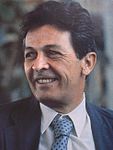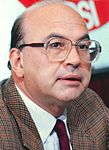1983 Italian Senate election in Lombardy
| |||||||||||||||||||||||||||||||||||||||||
All 48 Lombard seats to the Italian Senate | |||||||||||||||||||||||||||||||||||||||||
|---|---|---|---|---|---|---|---|---|---|---|---|---|---|---|---|---|---|---|---|---|---|---|---|---|---|---|---|---|---|---|---|---|---|---|---|---|---|---|---|---|---|
| |||||||||||||||||||||||||||||||||||||||||
| |||||||||||||||||||||||||||||||||||||||||
Lombardy elected its ninth delegation to the Italian Senate on June 26, 1983.[1] This election was a part of national Italian general election of 1983 even if, according to the Italian Constitution, every senatorial challenge in each Region is a single and independent race.
The election was won by the centrist Christian Democracy, as it happened at national level. Six Lombard provinces gave a majority or at least a plurality to the winning party, while the agricultural Province of Pavia and Province of Mantua, and this time the industrial Province of Milan, preferred the Italian Communist Party.
Background
[edit]As the red rising seemed to be stopped in Italy, many center-right electors began to think no more necessary a vote for Christian Democracy which lost many seats to minor parties, especially to the Italian Republican Party of former Prime Minister Giovanni Spadolini.
Electoral system
[edit]The electoral system for the Senate was a strange hybrid which established a form of proportional representation into FPTP-like constituencies. A candidate needed a landslide victory of more than 65% of votes to obtain a direct mandate. All constituencies where this result was not reached entered into an at-large calculation based upon the D'Hondt method to distribute the seats between the parties, and candidates with the best percentages of suffrages inside their party list were elected.
Results
[edit]| Party | votes | votes (%) | seats | swing |
|---|---|---|---|---|
| Christian Democracy | 1,747,002 | 34.4 | 17 | |
| Italian Communist Party | 1,447,823 | 28.5 | 15 | = |
| Italian Socialist Party | 615,644 | 12.1 | 6 | = |
| Italian Republican Party | 349,351 | 6.9 | 3 | |
| Italian Social Movement | 255,667 | 5.0 | 2 | |
| Italian Liberal Party | 197,084 | 3.9 | 2 | |
| Italian Democratic Socialist Party | 192,172 | 3.8 | 2 | = |
| Radical Party | 103,697 | 2.0 | 1 | = |
| Others | 168,885 | 3.3 | - | = |
| Total parties | 5,076,325 | 100.0 | 48 | = |
Sources: Italian Ministry of the Interior
Constituencies
[edit]- No senator obtained a direct mandate. Please remember that the electoral system was, in the other cases, a form of proportional representation and not a FPTP race: so candidates winning with a simple plurality could have (and usually had) a candidate (usually a Christian democrat) with more votes in their constituency.
- ^ Linked to Spadolini's triple election.
Substitutions
[edit]- Maurizio Noci for Crema (13.6%) replaced Libero Della Briotta in 1985. Reason: death.
- Gian Pietro Rossi for Busto Arsizio (34.1%) replaced Pietro Padula in 1986. Reason: resignation.
- Felice Calcaterra for Monza (32.9%) replaced Gian Pietro Rossi in 1986. Reason: resignation.
- Italo Nicoletto for Salò (26.2%) replaced Giuliano Procacci in 1986. Reason: resignation.
Notes
[edit]- ^ Howard R. Penniman, “Italy at the Polls, 1983: A Study of the National Elections”
- ^ Incumbent MP Paolo Zanini helped his party running for this seat. However, according to the Italian Constitution, MPs can't be senators, so he ceded his senatorial seat to his party-mate Francesco Pintus.



